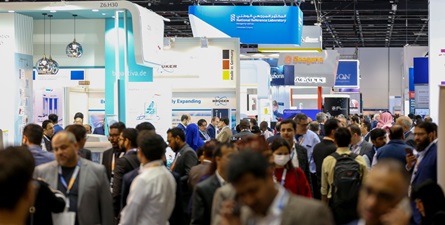|
|
Groundbreaking
NextGen Medicine under the
spotlight at Medlab Middle
East
(Dubai, UAE) -
Leading researchers
in NextGen medicine will
convene at the 2024 edition
of
Medlab Middle East, the
region’s largest medical
laboratory exhibition. A
cutting-edge field of
healthcare, NextGen medicine
uses genome sequencing to
create targeted healthcare
strategies for specific
populations and individuals
across a range of diseases
and rare conditions. In
collaboration with Express
Med Diagnostics and
Research, Medlab Middle East
will host a new zone and
conference dedicated to
NextGen medicine, when the
event takes place from 5 to
8 February.
The
National Human Genome
Research Institute (NIH)
based in the US, defines the
'genome' as the complete set
of DNA instructions present
in a cell, which contains
all the necessary
information required for an
individual's development and
functioning. In 2003, the
Human Genome Project
successfully developed the
first complete sequence of
the human genome, paving the
way for one of the most
transformative breakthroughs
in science and healthcare.
Dr Karolina Kobus,
Head of Genomics and
Precision Medicine Lab
Technology and Innovation
Advisor at Express Med
Diagnostics and Research,
said: “In recent years, the
advent of next-generation
sequencing (NGS), proteomics
and artificial intelligence
(AI) have allowed research
centers worldwide to
initiate scientific
programs, discover new
molecular pathways and
develop personalized
therapies. There are three
key components of NextGen
medicine – prevention, early
detection, and the
development of targeted
treatments. The future of
medicine is all about moving
away from a 'one size fits
all' approach, to more
personalised health
strategies. Screening
strategies must be adjusted
to the local reality as this
will ultimately save lives,
improve health outcomes, and
reduce the costs associated
with ineffective treatments.
“Global differences
in the prevalence and
distribution of diseases and
their risk factors is a
complex phenomenon
determined by population
history, adaptive evolution,
environmental, social,
demographic, cultural and
genetic factors. Genomic
inheritance is unique for
every population, and this
means that disease patterns
might differ in a Caucasian
individual compared with
those native to the Middle
East, for example. While
significant progress has
been made in genome projects
in the Western world, we
must acknowledge that the
current human genome that is
widely referenced is mainly
based on data from Caucasian
individuals.”
The
goal for researchers is to
replace the old ‘linear’
reference genome with a
‘graph’ genome that better
represents genetic diversity
across populations. In May
2023, the Human Pangenome
Reference Consortium (HPRC)
published an update on the
human pangenome based on 47
individuals, which
represents a wider genetic
diversity. The Arab
population however is still
underrepresented in the
human reference genome, a
situation that researchers
around the region are
working to rectify.
Tom Coleman, Group
Exhibition Director, Informa
Markets Healthcare, said:
“The Middle East genome
projects have the potential
to contribute significantly
to global science and
improve healthcare in the
region. This field of study
is extremely promising, and
the findings could lead to
major advancements in the
treatment of various
illnesses, such as diabetes,
heart disease, and cancer.
“Medlab’s
partnership with Express Med
Diagnostics and Research at
Medlab Middle East will
showcase the latest
advancements in medical
technology, precision
diagnostics and medical
laboratory solutions.
Chaired by Dr Karolina
Kobus, the NextGen Medicine
Conference will bring
together top industry
experts, researchers, and
healthcare professionals who
are driving innovations
forward. The conference will
share the latest updates on
regional genome projects and
delve into pressing topics
such as early cancer
detection, precision
oncology, preventative
health screening, and
longevity.”
In March
2023, the UAE launched a
10-year National Genome
Strategy to support the
development and
implementation of genomic
research projects and
improve public health
priorities in the UAE. The
project aims to accelerate
developments in personalized
medicine and combat chronic
and genetic diseases. The
Emirati Genome Program is
the founding project of the
UAE’s National Genome
Strategy and will explore
the genetic profile of
Emiratis using cutting-edge
DNA sequencing and
artificial intelligence.
Kobus added: “As shown
by recent research, it is
important to improve human
genetics studies by
including diverse ethnic
groups. This will help us to
better understand the risk,
and design appropriate
treatments and screening
strategies accordingly.
Country-specific genomes and
cancer genomes programs are
critical as they will
provide a road map of the
reference human genome and a
landscape of mutations
across many disease types in
Middle Eastern patients.”
The NextGen zone at
Medlab Middle East is a
unique platform in the
region that will bring
together a diverse group of
experts and professionals to
discuss the latest
advancements in NextGen
medicine. The conference
will attract lab
technicians, genetics
scientists, medical
oncologists, pathologists,
surgeons, and
representatives from
pharmaceutical companies,
who will engage in
productive discussions about
recent developments in the
field. The exchange of ideas
will pave the way for
progress in NextGen
medicine.
Medlab
Middle East is expected to
welcome more than 30,000
visitors and 900 exhibitors,
with representation from 180
countries. Tracks at the
event include Laboratory
Management, Hematology,
Quality Management, Clinical
Microbiology,
Histopathology, Clinical
Chemistry, Clinical Genomic
Interpretation, Future of
the Lab, Immunology, Blood
Transfusion Medicine, and
Sustainability in the Lab.
The Medlab Middle East
Congress returns for another
year, providing education
and solutions to advance
laboratory skills to over
5,000 delegates.
 PRINT
THIS ARTICLE
PRINT
THIS ARTICLE
|



